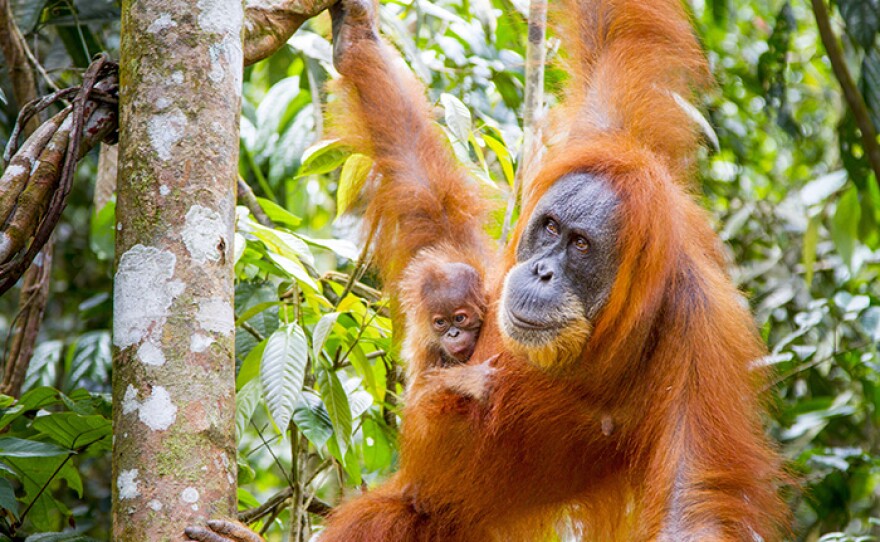Wednesdays, July 31 - Aug. 14, 2024 at 8 p.m. on KPBS TV / Stream the series now with KPBS Passport!
Visit 17 countries to uncover the mysteries of countless species, including gorillas, orangutans, lemurs, macaques and more! Welcome to the planet of the apes. Primates are called the highest order of animal on the planet. With their big brains, they are smart and adaptable; they use tools, self-medicate, hunt and swim. They are social and political, form hierarchies and friendships and can be very mischievous.
Get to know the many species of primates, from the familiar chimpanzee and gorilla, to the more obscure species like the owl monkey, the tamarin, the barbary macaque and many more in the three-part miniseries PRIMATES On NATURE.

Between gorillas, lemurs, orangutans and Japanese macaques, which primate do you most closely identify with? Take our short, multiple-choice quiz!
Citizen Science: Observe and record light pollution to help protect nocturnal animals with Globe at Night from the National Optical Astronomy Observatory (NOAO). Learn more!
Filmed across the globe over two years on 28 filming expeditions, from snow-capped mountains to the hottest deserts, PRIMATES combines family drama with the latest science. Uncover primates’ complex relationship dynamics, how they learn to hunt and feed, their courtship rituals and more. Discover the unexpected reason a silverback father chooses not to engage in gorilla warfare, watch macaques go bananas in pursuit of food in populated areas, and learn why “King of the Swingers” is a gibbon title.
Advances in technology allowed the team behind PRIMATES to film several extremely rare or never-before-seen moments, including one of the first images of the bald uakari and the recently discovered Tapanuli orangutan.
In Equatorial Guinea, one team spent more than two months camped on a remote beach to capture the most intimate images ever seen of a drill, one of the world’s least understood primates. In Sri Lanka, another crew captured the very first low-light color images of the elusive gray slender loris at night in the wild. In Malaysia, experience the lar gibbons’ canopy world from their perspective — a filmmaking first.

EPISODE GUIDE:
Episode 1: “Secrets Of Survival” Encore Wednesday, July 31, 2024 at 8 p.m. on KPBS TV / stream now with KPBS Passport! - Monkey see, monkey do. From baboons facing down leopards, to lemurs exploiting a jungle pharmacy or rhesus macaques charming their way to an easy life, discover the survival strategies used by primates, often in the most unexpected places. Bearded capuchins, counted among the smartest animals in the world, teach their young how to use tools in Brazil’s badlands.
A silverback gorilla gives in to his softer side to raise his boisterous offspring in the Congo basin. Bush babies conduct an after-hours raid of a city zoo to find food in the South African winter.
Episode 2: “ Family Matters” Encore Wednesday, Aug. 7, 2024 at 8 p.m. on KPBS TV / stream now with KPBS Passport! Family is everything for primates. They have the most complex social lives of any animal group on the planet. Meet devoted monkey dads, playmate apes and tender troops.
Dusky leaf monkeys compete to babysit a bright orange infant and rally to defend him from a python. Gibbons learn treetop acrobatics with their playmates. In Sri Lanka, a single gray slender loris mother takes care of her twins— the most intimate video ever captured of the species. In the Amazon, an elder female spider monkey leads her troop to a unique food resource.

See the first moving images of a Tapanuli orangutan mother and her infant, discovered to be a new species in 2017!

Episode 3: “Protecting Primates” Encore Wednesday, August 14 at 8 p.m. on KPBS TV / stream now with KPBS Passport! - More than half of the world’s primates are under threat. Meet the scientists making ground-breaking discoveries to safeguard their future.
In Malaysia, conservationists are building bridges to help dusky langurs cross busy roads. In the Democratic Republic of Congo, rangers face danger while trying to protect mountain gorillas. Conservationists in Borneo help prepare orangutan orphans for life in the wild. Two ecologists team up to locate some of Madagascar’s most elusive lemurs, and one renowned primatologist becomes the first person to see every type of primate that exists.
Watch On Your Schedule: Episodes are available to stream with KPBS Passport, a benefit for members at $60 or more yearly, using your computer, smartphone, tablet, Roku, AppleTV, Amazon Fire or Chromecast. Learn how to activate your benefit now.

Join The Conversation: NATURE is on Facebook, Instagram #NaturePBS
Credits: NATURE is a production of THIRTEEN PRODUCTIONS LLC for WNET and PBS. Fred Kaufman is Executive Producer; Bill Murphy is series producer and Janet Hess; and Danielle Steinberg is Digital Content & Strategy Lead. A BBC Studios production for PBS and BBC with THIRTEEN PRODUCTIONS LLC. Produced and directed by Nikki Waldron, Nick Easton and Victoria Buckley. Gavin Boyland is Series Producer and Michael Gunton is Executive Producer for BBC Studios. Nyambi Nyambi is narrator.






